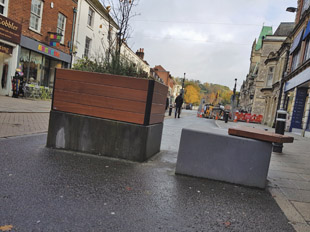BIDs are adopting a more confident and holistic approach in tackling crime and addressing ‘vulnerability issues’, it is claimed.
Business Improvement Districts have been delivering a wide range of benefits across UK towns and cities since 2003. However, the changing face of the high street has presented those BIDs with significant challenges to show their value in an ever-changing economic climate. Key aggravating drivers affecting performance are certainly austerity-related – recent cuts to local government and policing services and rising crime. BIDs are finding it increasingly harder to do crime reduction without the full support of their partner agencies. Hence a research study by Gordon Brockie, that you can read on the NABCP () website.
For the 39-page report in full visit https://www.nabcp.com/news/2020/1/9/the-bid-safe-and-secure-report.
According to the study, most BIDs ‘have the solid foundations of a Business Crime Reduction Partnership (BCRP) embedded into their ‘safe and secure’ models’, and the overall benefits they deliver ‘far exceed traditional town centre approaches to crime reduction’. The report sees a ‘growing confidence’ in BID crime managers, that has led to ‘an innovative and more holistic approach to crime reduction’ that takes in the societal issues as identified as priorities by the London Mayor’s Office for Policing and Crime (MOPAC).
While then, BIDs are doing good – and retailers are looking for a return on the levy that they have to pay, if they have businesses in a BID area – the report also sees a negative if BIDs don’t do that crime reduction work – suggesting that BID operating areas are the very heart of town centre communities, and ‘vulnerable to a downturn in economic prosperity that can rapidly lead to urban decay’. As the report points out, when asked, businesses paying the levy consistently rate safety-security and crime as a major issue that they want a local BID to address. Due to cuts, the report sees ‘ability of the police to deliver a satisfactory quality of service to our high streets is being significantly restricted’, meaning that ‘high visibility policing is now becoming a rarity in our town centres’.
The report concludes that success in crime reduction is ‘an uphill task’ and that BIDs are almost always the primary driver in initiatives – ‘despite not holding the mantle of statutory responsibility to reduce crime’. Among recommendations, the report suggests that BIDs should consider ‘introducing a more uniformed approach to their crime reduction schemes’, by adopting a nationally recognised BCRP (business crime reduction partnership) framework. And the report suggests that the Home Office should take a version of Victoria BID’s Emergency Notification System in Westminster (as featured in the January 2020 print issue of Professional Security magazine) as a national standard.
Some background
According to the report, as of July 2018, there were 305 Business Improvement Districts, that in total raise about £110m a year, which typically goes on services that could be provided by a council, such as street cleaning and graffiti and fly-tipping removal, but a BID is able to target and carry out extra services that might not otherwise get done, such as running and marketing events, and patrol staff, whether ambassador, meet-and-greet style or more actively tackling assaults on staff, shop theft and anti-social behaviour.
The report focuses on London; some half of BIDs there support police deployments of the Servator patrol method; and central London BIDs last year took part in CT (counter-terrorism) working groups to help shape the new ACT Strategic and ACT Operational counter terrorism training packages. BIDs can also link businesses with resources such as the NBCC (National Business Crime Centre), the report says.
The report quotes the Angel BID in north London on how BIDs are gradually moving away from the funding of police officers. Prior to 2019, London BIDs could ‘purchase’ police officers under the Met Police Plus ‘buy one, get one free’ scheme. Due to cuts in officer numbers, this scheme has now been replaced by the Partnership Plus scheme, causing a price increase of 70 per cent in police to BIDs. This is proving to be cost prohibitive to BIDs, the report finds.
Picture by Mark Rowe; anti-vehicle ram barriers as street furniture, Winchester. The BID in the Hampshire county town, and nearby Basingstoke BID, has high street patrollers from CSAS-accredited, Andover-based guarding company Venture Security, as featured in the January and February 2020 print editions of Professional Security magazine.









